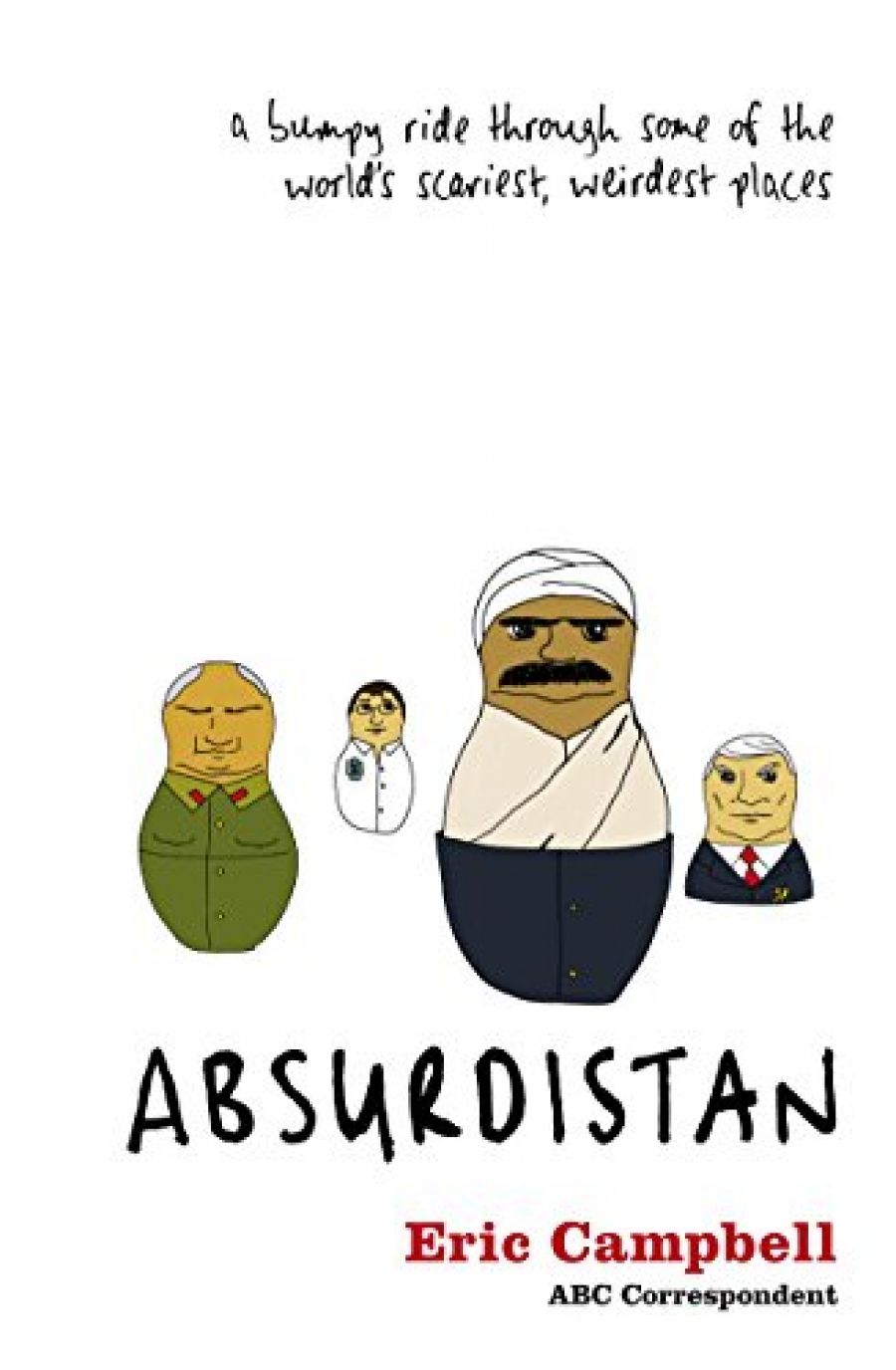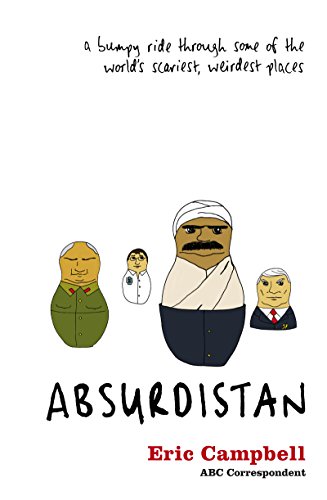
- Free Article: No
- Contents Category: Journalism
- Review Article: Yes
- Article Title: Why me?
- Online Only: No
- Custom Highlight Text:
The foreign correspondent Eric Campbell is lucky to be alive. In March 2003 he was filming in Kurdistan, Northern Iraq, with Paul Moran, a freelance cameraman whom he had just met, when a car bomb exploded in front of him. Moran was killed instantly, his body shielding Campbell from the worst of the blast. Both Moran and Campbell were new fathers. Although vastly experienced in covering conflicts, both men had decided at the start of the Iraq war that they would stay at the tail of the media pack when entering dangerous areas. They wanted to see their children grow up; Moran’s daughter was only six weeks old.
- Book 1 Title: Absurdistan
- Book 1 Subtitle: A bumpy ride through some of the world's scariest, weirdest places
- Book 1 Biblio: HarperCollins, $29.95 pb, 334 pp
- Book 1 Cover Small (400 x 600):

- Book 1 Cover (800 x 1200):

This tragedy and its aftermath bind this book together and make what would otherwise be an entertaining and intriguing memoir something more. The experience of suffering and loss rather than reporting on it changes the way Campbell regards his job. No longer allowed a reporter’s detachment, he wonders why he ever thought reporting wars would be fun.
I recall interviewing Campbell upon his return to Australia after the explosion and Moran’s death. Although he still had the calm, professional reporting style that was part of his tools of trade, I could tell that he was wrestling with emotions he found difficult to control. All the issues that had assaulted the millions of others he had observed as a reporter – the senselessness of violence, the nihilism of war – came crowding in upon him. Was it his fault? Why had a suicide bomber driven a car laden with explosives to that particular spot? Why him?
Campbell was the ABC’s correspondent in Moscow and Beijing from 1995 until 2003, interesting times for any correspondent. Absurdistan records his experiences in both countries. His arrival in Moscow coincided with the ageing Boris Yeltsin’s nomination for another term as president. With a resurgent Communist Party, many thought that Yeltsin was finished – if the vodka bottle didn’t finish him first.
Campbell’s descriptions of post-Yeltsin Moscow – the corruption, depravity, and hopelessness – are wonderfully brutal. Privatisation has simply handed state assets to the sons of former party bosses. The New Russia is run by criminals, asset strippers and corrupt officials. Vast wealth is accumulated in the hands of a few. The old economy is bankrupt. One factory outside Moscow is famous for its blown glass, but it cannot pay its workers, so they receive glass work from the factory, in lieu of payment. Each week, the glass workers gather in markets trying to sell glass swans and crystal concoctions to each other for cash. It’s sad and absurd, but so is much of what Campbell encounters.
Few places can rival the former Soviet Republic of Kalmykia on the shores of the Caspian Sea. Presided over by a corrupt murderer and chess nut called Kirsan Ilyumzhinov, who had enriched himself by stealing state assets, this bizarre place was declared by Ilyumzhinov to be the chess capital of the world. While the population starved, he squandered millions on a chess Olympiad and made chess a compulsory subject in schools.
Campbell certainly gets around, interviewing everyone from reindeer herdsmen in the Arctic Circle to Serbs in Kosovo. He covers the horrors of the Chechen guerrilla war and the madness of Slobodan Milosevic. His book is episodic, well written and thoroughly entertaining. Absurdistan provides the reader with an excellent insight into the degrees of resourcefulness and personal courage that are required in a foreign correspondent. Soon after arriving in Moscow, Campbell’s wife announces that she is leaving him to marry a mutual friend back in Australia. Devastated and alone, with no Russian language skills and little access to other people, Campbell has to cope with the continuous demands from news desks in Australia for fresh material. He works around the clock, loses a lot of weight and, you sense, learns fast. In May 2001 he takes up the position of correspondent in Beijing. He quickly runs foul of Chinese authorities who are intent on controlling foreign media as effectively as they control their own. A story on the railway line the Chinese are building into Tibet particularly displeases authorities, as does the suggestion that the Chinese invaded Tibet. ‘How would you feel if we declared that Australia was invaded by the British,’ says an exasperated Chinese official.
For Campbell, by the book’s end, things are looking up, although professionally he is frustrated by officialdom. He has a new wife, an Australian whom he met in Russia; they have a baby boy on the way. His wife Kim is not at all anxious that he should put his hand up to cover the war in Iraq. By March 2003 he is in Kurdistan with cameraman Paul Moran. Which is where we began.


Comments powered by CComment